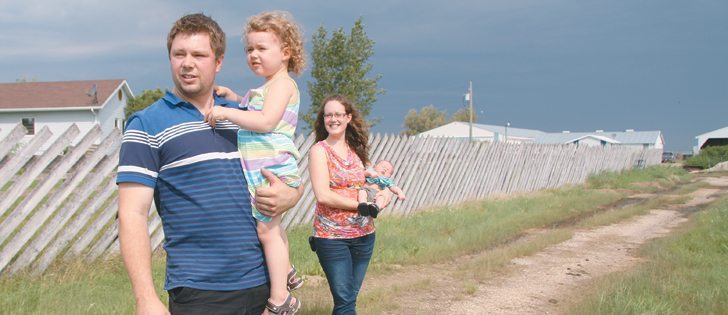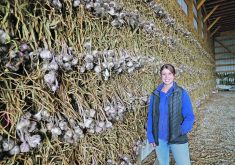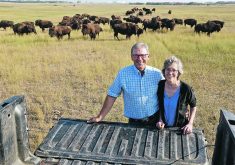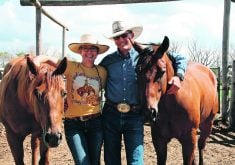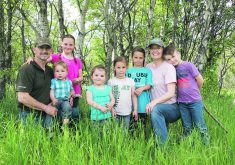BALMORAL, Man. — Neil Versavel is not the type of person who likes to sit and relax.
Sitting in an office chair inside his veterinary clinic 20 minutes north of Winnipeg, Versavel held his one-month-old son, Aiden, and continually swivelled the chair back and forth for seven to 10 minutes. Many people rock or sway babies to keep the child calm, but it was obvious that Versavel was itching to get up and do something.
Constant motion is a normal part of life for Versavel. He is married with two young children, operates Equi-Tech Veterinary Clinic with his father and raises sheep.
Read Also

Intergenerational rollover rules can help succession plans
One of the most significant concerns in succession planning for farmers is the tax bill that can come with passing the farm to the next generation.
Working 70 to 80 hours per week, including nights and weekends, is normal for Versavel.
“We do full on-call. Dad and I are on call every second night and every second weekend,” Versavel said.
“So when we’re busy, I usually work 28 out of 30 days a month.”
Versavel didn’t seem stressed by the workload or the demands of two children younger than three. He laughed and joked frequently while explaining how he became a mixed vet, tending to large and small animals, in and around Balmoral.
Versavel grew up on a farm north of Stonewall, Man., with his brother and parents, Hilary and Luc. Like many high achievers, Versavel knew what he wanted to do for a career at an early age.
“I was about eight when I first decided (to become a vet),” said Versavel, who graduated from the University of Saskatchewan’s Western College of Veterinary Medicine in 2009.
“Mom often worked nights (as an intensive care unit nurse in Winnipeg)…. Dad was a single veterinarian in his practice. So when Dad had to go to emergencies during the night … he would haul us along with him. So we got exposed to a lot.”
In addition to nursing and vet work, Versavel’s parents also operated a farm while raising two boys.
They still run the farm, producing hay and raising a herd of livestock, mostly cattle and sheep. The vet clinic is located on their farmyard.
As a boy, Neil developed an interest in livestock and briefly considered a full-time career as a farmer.
“For the longest time I also did want to farm,” he said, as his two-year-old, Melodie, drew pictures at a desk in the veterinary clinic.
“(But) I knew through veterinary that I could still be part of agriculture…. I just decided I would become a vet and maybe farm at the same time. It never occurred to me to do anything different.”
Versavel met his wife, Valerie Millette, at vet school in Saskatoon. She grew up in Calgary but after graduation they moved to the eastern Prairies to begin the next stage of their relationship.
“I somehow managed to convince her to come to Manitoba and live a rural life,” Versavel said with a shake of his head and a laugh.
Adjusting to life on 80 acres near the village of Balmoral wasn’t difficult for Millette because she thought Calgary was too big and busy.
Both of her parents grew up in Saskatchewan: her father in Melville and her mother in Gravelbourg. Millette, perhaps for genetic reasons, was drawn toward open countryside and a simpler life.
“I think it’s in my blood…. I consider myself a prairie girl. I always felt at home visiting my relatives in Saskatchewan and I really enjoyed my time living in Saskatoon,” she said, adding she loves the pasture and woodland on their property in Manitoba’s southern Interlake region.
“It’s like I’m camping every day. I’m in heaven. It’s absolutely wonderful.”
Like her husband, Millette knew she wanted to be a vet when she was in elementary school.
In Grade 4, her teacher assigned a class project where students had to choose a potential career.
“That’s the one I picked and it just kind of stuck with me.”
Millette’s grandfather was a medical doctor in rural Saskatchewan and she wanted to maintain the family’s connection to medicine, in a slightly different way.
“I’ve always felt drawn to learning about my roots,” said Millette, whose family has been in Canada for 13 generations, beginning in Acadia.
Besides running the clinic with his father, Versavel has also taken over the family’s sheep operation.
He raises purebred Suffolk sheep and is part of the Canadian Lamb Producers Co-operative.
He described raising sheep as a part-time gig that keeps him occupied.
“Say I quit farming… If you’re the kind of person who likes (to be busy), you’re not going to do nothing… I’ve always enjoyed working with livestock.”
Like all parents who attempt to balance career and parental duties, Versavel and Millette are constantly on the go, but both are satisfied with their choice of vocation.
However, since graduating six years ago, they have learned that a vet’s job description is much broader than treating cats, dogs and horses.
“A lot of people think veterinary medicine is about working with animals,” Versavel said.
“I would say it’s easily 50 percent about people. Every animal you deal with has a person next to it.”


